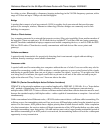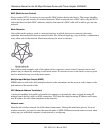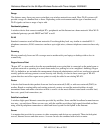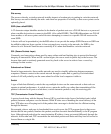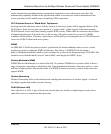
Reference Manual for the 54 Mbps Wireless Router with Phone Adapter WGR826V
Glossary
9
202-10051-01, March 2005
NIC (Network Interface Card)
A type of PC adapter card that either works without wires (Wi-Fi) or attaches to a network cable to provide
two-way communication between the computer and network devices such as a hub or switch. Most office
wired NICs operate at 10 Mbps (Ethernet), 100 Mbps (Fast Ethernet) or 10/100 Mbps dual speed.
High-speed Gigabit and 10 Gigabit NIC cards are also available. See PC Card.
PC card (also called PCMCIA)
A removable, credit-card-sized memory or I/O (input/output) device that fits into a Type 2 PCMCIA
standard slot, PC Cards are used primarily in PCs, portable computers, PDAs and laptops. PC Card
peripherals include Wi-Fi cards, memory cards, modems, NICs, hard drives, etc.
PCI adapter
A high-performance I/O computer bus used internally on most computers. Other bus types include ISA and
AGP. PCIs and other computer buses enable the addition of internal cards that provide services and features
not supported by the motherboard or other connectors.
Peer-to-peer network (also called Ad-Hoc in WLANs)
A wireless or wired computer network that has no server or central hub or router. All the networked PCs are
equally able to act as a network server or client, and each client computer can talk to all the other wireless
computers without having to go through an access point or hub. However, since there is no central base
station to monitor traffic or provide Internet access, the various signals can collide with each other, reducing
overall performance.
PHY
The lowest layer within the OSI Network Model. It deals primarily with transmission of the raw bit stream
over the PHYsical transport medium. In the case of wireless LANs, the transport medium is free space. The
PHY defines parameters such as data rates, modulation method, signaling parameters, transmitter/receiver
synchronization, etc. Within an actual radio implementation, the PHY corresponds to the radio front end and
baseband signal processing sections.
Plug and Play
A computer system feature that provides for automatic configuration of add-ons and peripheral devices such
as wireless PC Cards, printers, scanners and multimedia devices.
Proxy server
Used in larger companies and organizations to improve network operations and security, a proxy server is
able to prevent direct communication between two or more networks. The proxy server forwards allowable
data requests to remote servers and/or responds to data requests directly from stored remote server data






